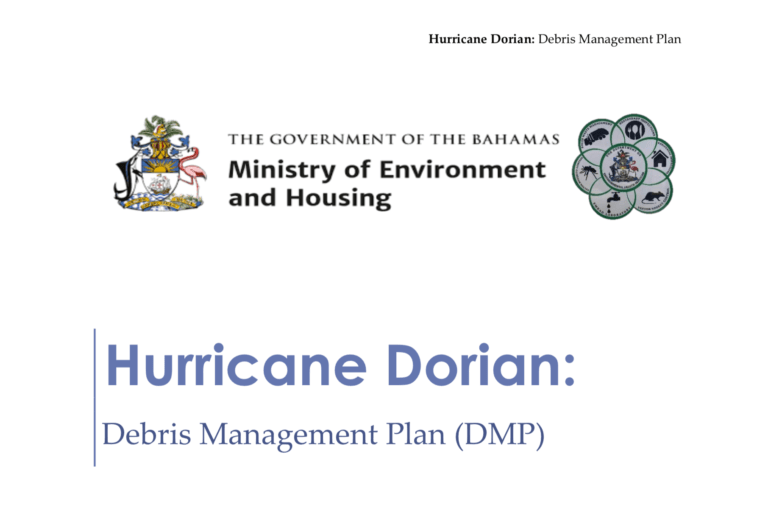NASSAU, BAHAMAS – The Ministry of Environment and Housing plans to grind storm debris on mainland Abaco and Grand Bahama, and conduct air-curtain burning of debris on smaller cays in a bid to reduce costs.
The Debris Management Plan, dated November 12, underscores the Hurricane Dorian debris mission will be expensive.
However, it states millions of dollars could be saved by taking this “radical approach”.
An air curtain incinerator (ACI) is a pollution control device for open burning.
“ACI units (containers or trailered) are small and highly mobile,” the report read.
“The units also yield 90-95 percent vegetative reduction ratio.
“Abaco and Grand Bahama can support larger grinding operations and provide the mulch material back to organic/composting farms, beautification of areas and erosion control. This avoids costly barging operations to other island or other countries with vegetative debris.”
Debris types include, mulch, unprocessed woody debris, ash, metals, rubble, asphalt shingles, inoperable white goods and gasoline powered tools; and electronic waste.
The report also outlined “practical applications” for various types of debris collected and sorted at debris management sites.
It said mulch material can be used around the islands.
The report states one person will be identified in Abaco and Grand Bahama, who owns land or purchases land to dispose of residual mulch in windrows, and for negotiated tipping fees between government and the land owners.
According to the report, the land owners will be responsible for turning windrows and making a compost product for reuse later to beautify areas; resold to resort and residents or given to local farmers who lost topsoil.
“Essentially, the concept is to create a new market within the local economy for composting products,” the report notes.
“Sidney Sinclair of Down Too Earth Adventure Farm could be used in Abaco given his experience in the field and connection to the farming community throughout The Bahamas. Additionally, Ceres Bahamas offers its soil specialists from its sister company ‘The Ground Up’ that engineer specific soil products for local governments and developers in the U.S.”
Additionally, the report noted that logs can be used in the rebuilding process as long as a mill or portable mill is available; ash can be recycled into forest soil amendments as a lime substitute; metals shall be separated into ferrous and non-ferrous metal using metal maulers and shredders and sold to metal recycling firms; rubble reduced by crushing can be used as a sub-based pavement in infrastructure projects; and asphalt shingles can be recycled and given to the Department of Works for asphalt paving and pothole repair.
As part of the debris management plan, the department has outlined a cost tracking and recordkeeping plan aimed at logically tracking individual costs across the life of the project.
To track costs, the debris mission manager will assign a mission recordkeeper or as many as needed from the department or temporary employee to maintain the records from the various control documents and forms related to debris removal and documented.
It will be the job of the record keeper to reconcile physical tickets to ensure proper tracking and allocation of individual costs to each definable feature of work.
The recordkeeper will also meet with the contractor each afternoon to reconcile the previous day’s load ticked and removal sheets of hazardous items.
The contractor will be allowed to invoice the department once monthly for work performed on an independent operation and reconciled with the project recordkeeper.
The report notes that beyond the high cost of cleanup following the storm, large amounts of debris threaten public health and safety by harboring rodents and disease.



What about people breathing in the toxic fumes from the rubble being burnt? Worrying about rodents and disease is only one great worry but more people will die from breathing in the toxic fumes. These curtains will only contain so much.
Wouldn’t it be wiser to take the rubble that is to be burned, to a very remote island and be burned there? Where the fumes will bother no one? The people that are operating these burn sites must be outfitted with PROPER GEAR to protect themsthemselves or they will die from the toxic fumes.
This is nothing to take lightly, proper research needs to be done to protect the residents and visitors alike, from inhaling the toxic smoke!
It’s not like making a bonfire on the beach!